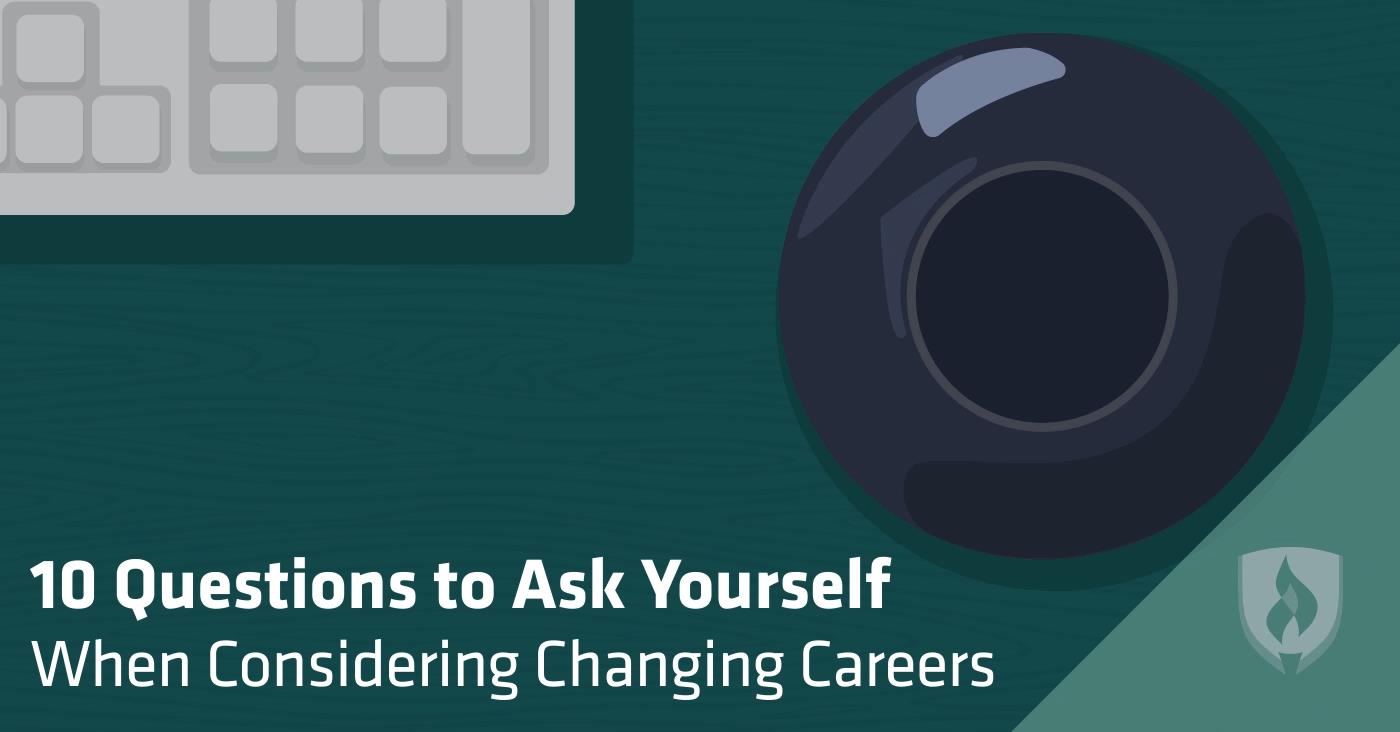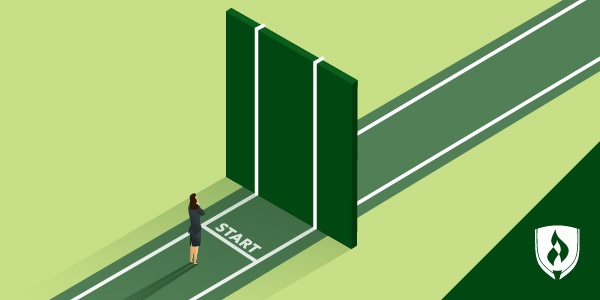Taking a critical look at your professional life can be exhilarating. After all, a career change can transform your entire future—not to mention your day-to-day life. Plenty of people feel dissatisfied with their careers but don’t take decisive action to change anything. Making that change can be an empowering-yet-scary experience.

While you may feel like you’re completely ready to change the course of your career, it would be foolish to not ask yourself a few questions first. To help make sure you’re asking the right questions, we enlisted career mentors and career changers themselves to help us identify some of the most important questions to consider before changing careers.
10 things to consider before changing careers
Knowing the answers to these 10 questions will help you ensure you’re making the right decision with your career change.
1. Does the new career match my priorities in life?
“A big mistake—and one that I almost made—is to make a career change for reasons that don't align with my values,” says Brianna Valleskey, owner of Brave Ink LLC.
Valleskey says she wanted a change in life and thought becoming a developer might be the answer. “I was doing it for the wrong reasons. My goal was to quickly jump into a new career where I could earn a lot more money so I could travel."
Valleskey realized that while travel was a real passion, making lots of money really wasn’t enough to justify drastically changing course, particularly when travel was still an attainable option.
“Avoiding that mistake was one of the best decisions I've ever made, because starting my own business gave me both the time and money needed to travel,” Valleskey says. She suggests nailing down what your true priorities are and asking how a new career would help you focus on them.
2. Can I afford to make this change?
“Often a career change will involve earning less, at least in the short-to-medium term,” says Denis Geoghegan, founder of EPM.
Perhaps your change will involve earning a new degree or certificate, or maybe you will have to invest a few months of interning to gain experience or start in an entry-level position. While your career change might boost your earning potential in the long run, the transition itself might dip into your time or savings.
“It's important to ensure you have the financial capability to manage the transition, including some reserve funds for unexpected expenditures,” Geoghegan says.
3. Can this decision be reversed?
If the answer is “no”, that doesn’t mean you shouldn’t make the change. But it is important to know if you will have bridges back to your old career if need be.
“The grass can always look greener on the other side of a career change, but sometimes reality can fail to live up to our expectations,” Geoghegan says. He advises hopeful career changers to think very carefully about their transition when it isn't possible to move back into your previous career, just in case things don’t work out as planned.
4. How will this affect my loved ones?
“If you're single and without a child, then any decision you make only affects you,” Geoghegan says. “But if you have a family, you need to be thinking about them too.”
Geoghegan advises talking about the career change with your loved ones, discussing potential pros and cons and ensuring that everyone is on the same page. It’s a conversation you want to have before stressors occur—not when you’re in the middle of the transition.
5. Am I ready to face new mental challenges?
If you’ve been working in your current career for a long time, you’ll want to evaluate your readiness to be a rookie again. You’ll essentially be starting from scratch again, which will certainly be a change of pace.
“Be realistic here,” Valleskey says. “If you want to try something new, that's great. But can you shoulder the mental struggle of learning new skills and building new networks?”
Valleskey says the learning curve is no problem as long as you are prepared to face challenges and come at them with everything you’ve got. If you are motivated and passionate about the potential new career, this shouldn’t be an issue.
6. Why now?
“Was there an event, a series of events or was this something you've been thinking about for years?” asks Nancy Halpern, principal of KNH Associates. Halpern says the decision to make a change is often made out of emotion—frustration, boredom, dealing with a boss you don't like—and may require some second thought.
“Maybe you're going through a big personal change such as a divorce, that is causing you to be unfocused and wish for a career change, or maybe you're working on a particularly stressful project right now,” Geoghegan says. If immediate circumstances are your motivation, wait a while to be sure the change is what you want.
If the trouble is your current boss or company, Halpern says it would be smart to look at other job options in your field rather than completely jumping ship.
“Since starting a new career often means taking one or two steps back and beginning again, it's important that you do it with a clear head,” Halpern says.
7. What will the day-to-day life of my new career be like?
“Before changing careers, people should think very carefully about whether the new career is a good fit for them on a deeply personal level, or if it's just a move out desperation for change,” says Jill Santopietro, owner of 21 Oak HR Consulting. “Do some personal work on discovering who you are and what drives your work passions.”
Santopietro says you might think computer programming sounds awesome, for example, but says if you're a big picture, can’t-sit-still kind of person, starting a career that’s focused on details and functions and staring at lines of code for hours might feel off to you.
Ultimately, Santopietro says the real question is whether or not a career matches you. Do as much research as you can beforehand to find out what your daily tasks will look like.
8. How can my background benefit me?
In a career change, you will likely be starting from square one in the new career. Shawn Bushouse, executive vice president of J Skinner Baking, says it’s important to acknowledge that while you are new to the career, there are other people who’ve been preparing for it and building toward it their entire lives. “They will have amassed skills and industry context to be very good at it.”
But Bushouse says this can be an asset in a way. “[Your unique history] simply raises the bar for yourself and should encourage you to explore why your specific background actually gives you an advantage.”
“Today’s business environment requires everyone to be more than just specialized, but to have a strong business mind. Different backgrounds can be significant supplements to traditional experience,” Bushouse says. Think about how your current position and the skills you’ve developed will help you be an asset in your new field.
9. What steps I can take first?
“An ideal scenario is to start making steps into your new career before leaving your current one,” Valleskey says. Maybe you can find a few free classes or take an online certification program in the evenings after work. Join a conference and start networking. There are potentially small ways you can ease into the new industry before pulling the plug on your current job.
10. Do I know anyone in this new field?
For many, a career change means moving back to square one when it comes to developing industry contacts, so it can be a real help if you have a head start. Even if you don’t know anyone in your desired field at the moment, it’s important to be proactive in trying to build new relationships.
“Meet as many people as possible in the career field you are switching to,” Valleskey says. “Find a mentor who can help you navigate through your change. Join both local and virtual communities within your industry so that you can network and build your personal brand.”
No matter what industry you are switching to, there are bound to be people who can be a resource. Reach out, show up to events and do whatever you can to meet them—they may just save you from a rookie mistake or two.
Have you checked the boxes?
If you’ve asked yourself these questions and still feel ready to proceed—congratulations! Changing careers is an exciting pursuit that can be extremely rewarding.
Now that you’ve investigated more of the “Why?” behind your change and considered the important questions, you may be ready to start planning your next steps. Get some expert advice on that process in our article, “6 Pieces of Career Change Advice You’ll Regret Ignoring.”
RELATED ARTICLES:




